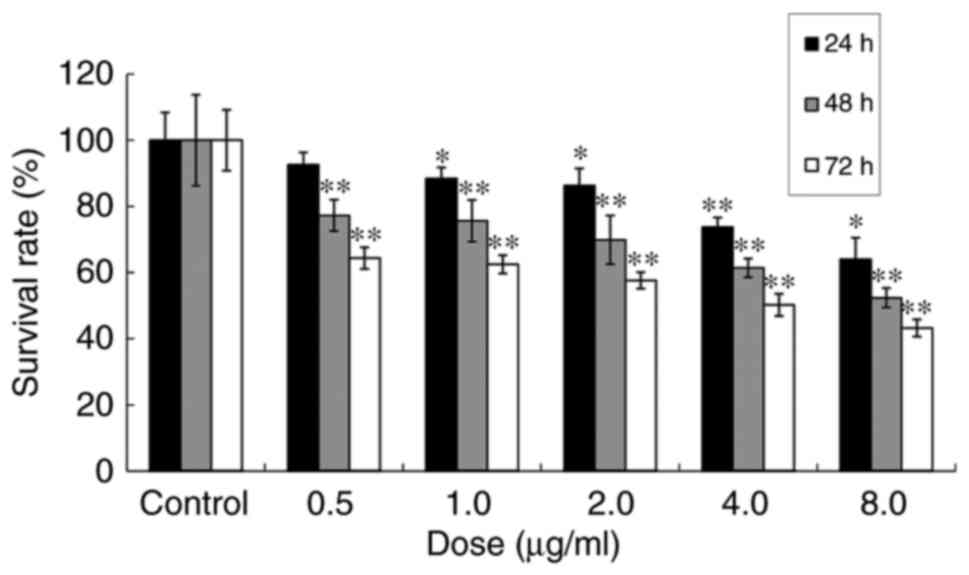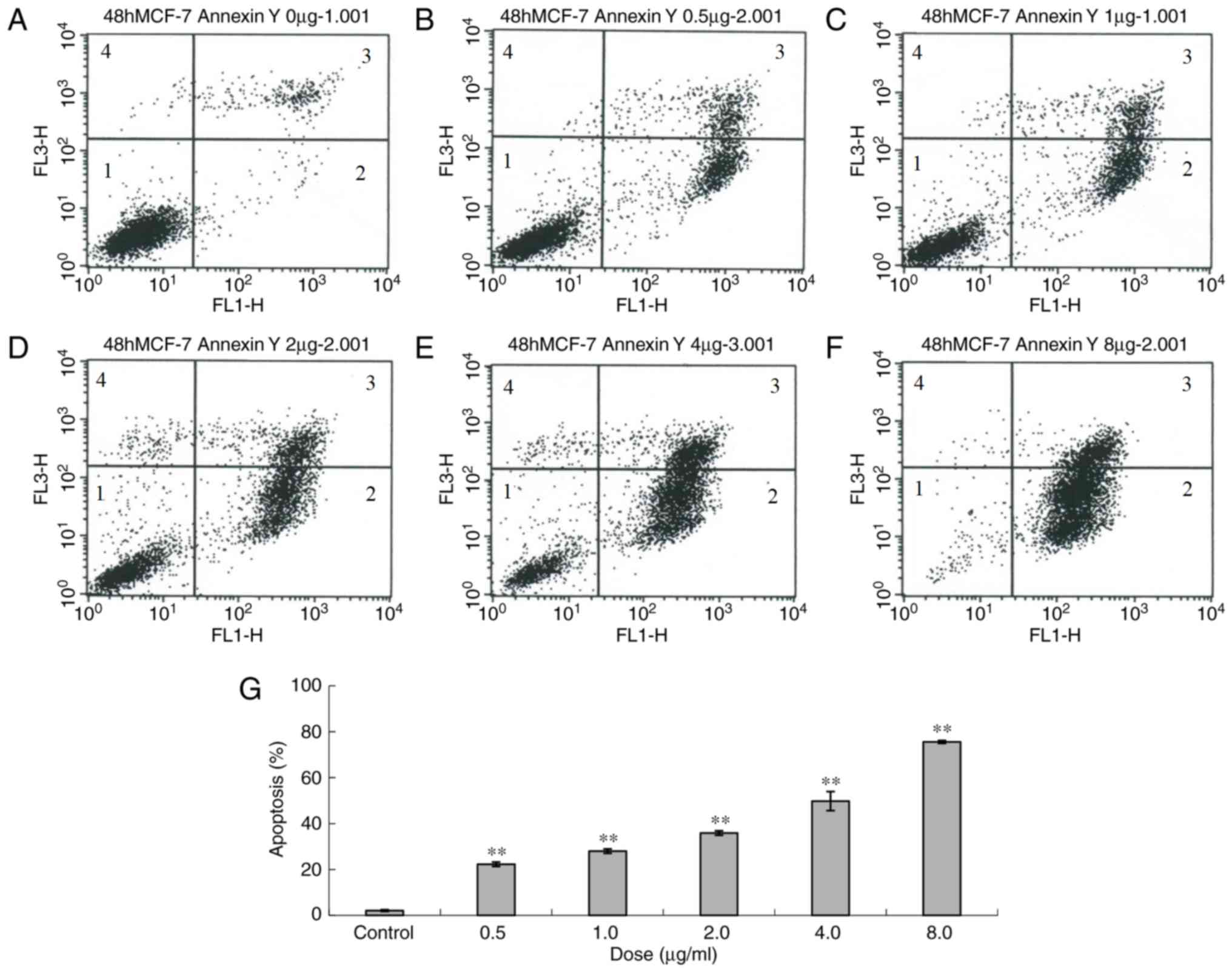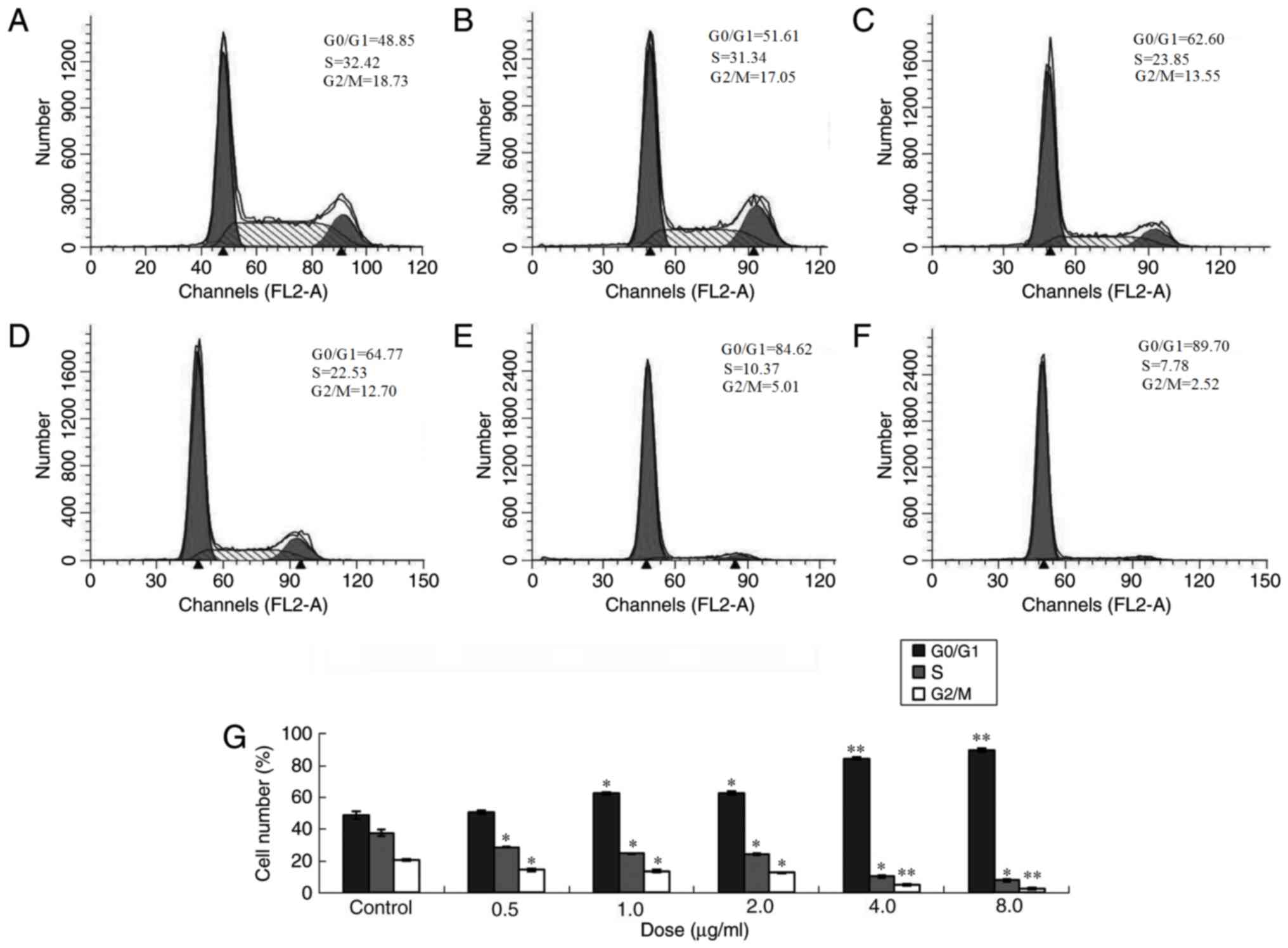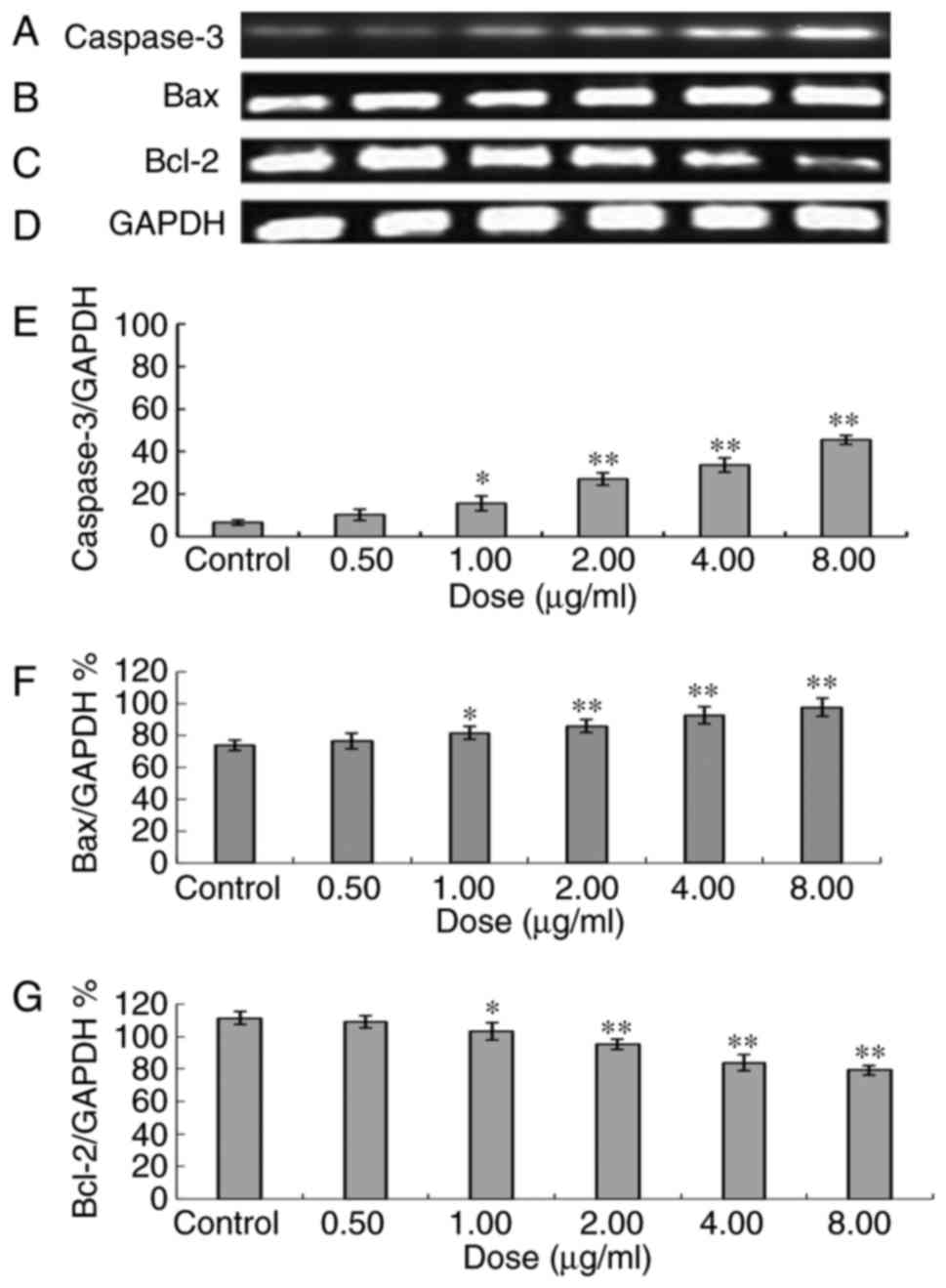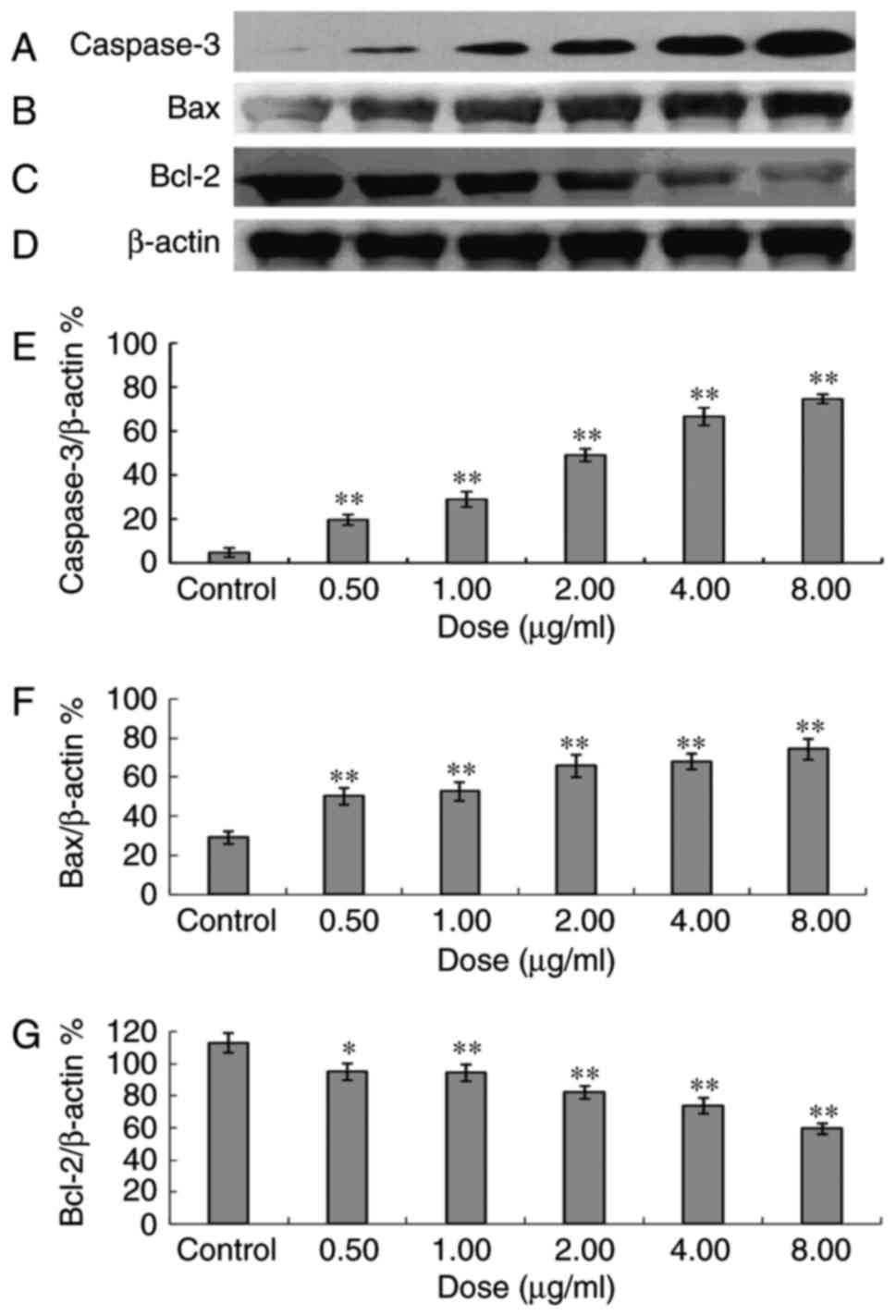|
1
|
Khoobchandani M, Ojeswi BK, Sharma B and
Srivastava MM: Chenopodium album prevents progression of cell
growth and enhances cell toxicity in human breast cancer cell
lines. Oxid Med Cell Longev. 2:160–165. 2009. View Article : Google Scholar : PubMed/NCBI
|
|
2
|
Tokgun O, Akca H, Mammadov R, Aykurt C and
Deniz G: Convolvulus galaticus, crocus antalyensis, and lilium
candidum extracts show their antitumor activity through induction
of p53-mediated apoptosis on human breast cancer cell line MCF-7
Cells. J Med Food. 11:1000–1005. 2012. View Article : Google Scholar
|
|
3
|
Binkley JM, Harris SR, Levangie PK, Pearl
M, Guglielmino J, Kraus V and Rowden D: Patient perspectives on
breast cancer treatment side effects and the prospective
surveillance model for physical rehabilitation for women with
breast cancer. Cancer. 8:2207–2216. 2012. View Article : Google Scholar
|
|
4
|
Sitzia J and Huggins L: Side effects of
cyclophosphamide, methotrexate, and 5-fluorouracil (CMF)
chemotherapy for breast cancer. Cancer Pract. 6:13–21. 1998.
View Article : Google Scholar : PubMed/NCBI
|
|
5
|
da Rocha AB, Lopes RM and Schwartsmann G:
Natural products in anticancer therapy. Curr Opin Pharmacol.
1:364–369. 2001. View Article : Google Scholar : PubMed/NCBI
|
|
6
|
Efferth T, Li PC, Konkimalla VS and Kaina
B: From traditional Chinese medicine to rational cancer therapy.
Trends Mol Med. 13:353–361. 2007. View Article : Google Scholar : PubMed/NCBI
|
|
7
|
Olaku O and White JD: Herbal therapy use
by cancer patients: A literature review on case reports. Eur J
Cancer. 47:508–514. 2011. View Article : Google Scholar : PubMed/NCBI
|
|
8
|
Dennis T, Fanous M and Mousa S: Natural
products for chemopreventive and adjunctive therapy in oncologic
disease. Nutr Cancer. 61:587–597. 2009. View Article : Google Scholar : PubMed/NCBI
|
|
9
|
Ho JW, Leung YK and Chan CP: Herbal
medicine in the treatment of cancer. Curr Med Chem Anticancer
Agents. 2:209–214. 2002. View Article : Google Scholar : PubMed/NCBI
|
|
10
|
Pezzuto JM: Plant-derived anticancer
agents. Biochem Pharmacol. 53:121–133. 1997. View Article : Google Scholar : PubMed/NCBI
|
|
11
|
Kinghorn AD, Farnsworth NR, Doel Soejarto
D, Cordell GA, Pezzuto JM, Udeani GO, Wani MC, Wall ME, Navarro HA,
Kramer RA, et al: Novel strategies for the discovery of
plant-derived anticancer agents. Pure Appl Chem. 71:611–618. 1999.
View Article : Google Scholar
|
|
12
|
Lee KH: Anticancer drug design based on
plant-derived natural products. J Biomed Sci. 6:236–250. 1999.
View Article : Google Scholar : PubMed/NCBI
|
|
13
|
Bishayee A: Editorial: Current advances in
cancer prevention and treatment by natural products. Curr Pharm
Biotechnol. 13:115–116. 2012. View Article : Google Scholar : PubMed/NCBI
|
|
14
|
Efferth T, Li PC, Konkimalla VS and Kaina
B: From traditional Chinese edicine to rational cancer therapy.
Trends Mol Med. 13:353–361. 2007. View Article : Google Scholar : PubMed/NCBI
|
|
15
|
De Feo V, De Martino L, Quaranta E and
Pizza C: Isolation of phytotoxic compounds from tree-of-heaven
(Ailanthus altissima swingle). J Agric Food Chem. 51:1177–1180.
2003. View Article : Google Scholar : PubMed/NCBI
|
|
16
|
Rahman S, Fukamiya N, Ohno N, Tokuda H,
Nishino H, Tagahara K, Lee KH and Okano M: Inhibitory effects of
quassinoid derivatives on Epstein-Barr virus early antigen
activation. Chem Pharm Bull (Tokyo). 45:675–677. 1997. View Article : Google Scholar : PubMed/NCBI
|
|
17
|
Wang Y, Wang WJ, Su C, Zhang DM, Xu LP, He
RR, Wang L, Zhang J, Zhang XQ and Ye WC: Cytotoxic quassinoids from
Ailanthus altissima. Bioorg Med Chem Lett. 23:654–657. 2013.
View Article : Google Scholar : PubMed/NCBI
|
|
18
|
Okunade AL, Bikoff RE, Casper SJ, Oksman
A, Goldberg DE and Lewis WH: Antiplasmodial activity of extracts
and quassinoids isolated from seedlings of Ailanthus altissima
(Simaroubaceae). Phytother Res. 17:675–677. 2003. View Article : Google Scholar : PubMed/NCBI
|
|
19
|
Kundu P and Laskar S: A brief resume on
the genus Ailanthus: chemical and pharmacological aspects.
Phytochem Rev. 9:379–412. 2010. View Article : Google Scholar
|
|
20
|
Rosati A, Quarantam E, Ammirante M, Turco
MC, Leone A and De Feo V: Quassinoids can induce mitochondrial
membrane depolarisation and caspase 3 activation in human cells.
Cell Death Differ. 11 Suppl 2:S216–S218. 2004. View Article : Google Scholar : PubMed/NCBI
|
|
21
|
Casinovi CG, Ceccherelli P, Grandolini G
and Bellavita V: On the structure of ailanthone. Tetrahedron Lett.
5:3991–3997. 1964. View Article : Google Scholar
|
|
22
|
Bishayee A, Háznagy Radnai E, Mbimba T,
Sipos P, Morazzoni P, Darvesh AS, Bhatia D and Hohmann J:
Anthocyaninrich black current extract suppresses the growth of
human hepatocellular carcinoma cells. Nat Pred Commun. 5:1613–1618.
2010.
|
|
23
|
Kim MJ, Kim YJ, Park HJ, Chung JH, Leem KH
and Kim HK: Apoptotic effect of red wine polyphenols on human colon
cancer SNU-C4cells. Food Chem Toxicol. 44:898–902. 2006. View Article : Google Scholar : PubMed/NCBI
|
|
24
|
Lu YJ, Xu Q, Chen L, Zuo Y, Liu S, Hu Y,
Li X, Li Y and Zhao X: Expression of semaphorin 6D and its receptor
plexin-A1 in gastric cancer and their association with tumor
angiogenesis. Oncology. 12:3967–3974. 2016.
|
|
25
|
Moysich KB, Beehler GP, Zirpoli G, Choi JY
and Baker JA: Use of common medications and breast cancer risk.
Cancer Epidemiol Biomarkers Prev. 7:1564–1595. 2008. View Article : Google Scholar
|
|
26
|
Kim DW, Hong GH, Lee HH, Choi SH, Chun BG,
Won CK, Hwang IK and Won MH: Effect of colloidal silver against the
cytotoxicity of hydrogen peroxide and naphthazarin on primary
cultured cortical astrocytes. Int J Neurosci. 117:387–400. 2007.
View Article : Google Scholar : PubMed/NCBI
|
|
27
|
Duan JA, Su SL and Qian DW: Approaches and
advances in the resources chemistry of Chinese medicinal material.
Chin J Nat Med. 7:333–340. 2009. View Article : Google Scholar
|
|
28
|
Zhuo Z, Hu J, Yang X, Chen M, Lei X, Deng
L, Yao N, Peng Q, Chen Z, Ye W and Zhang D: Ailanthone inhibits
Huh7 cancer cell growth via cell cycle arrest and apoptosis in
vitro and in vivo. Sci Rep. 5:161852015. View Article : Google Scholar : PubMed/NCBI
|
|
29
|
James BR and Griffith TS: Activation of
systemic antitumor immunity via TRAIL-induced apoptosis.
OncoImmunology. 17:1178–1180. 2012. View Article : Google Scholar
|
|
30
|
Chen M, Xu XYX D, et al: Inhibiting Bcl-2
gene expression enhance radiosensitivity of non-small cell lung
cancer NCI-H460 cells. China Oncology. 20:641–5. 2010.
|
|
31
|
Bai X, Che F, Li J, Ma Y, Zhou Y, Zhai J
and Meng L: Effects of adenovirus-mediated p16 and p53 genes
transfer on apoptosis and cell cycle of lung carcinoma cells.
Zhonghua Bing Li Xue Za Zhi. 29:354–358. 2000.(In Chinese).
PubMed/NCBI
|
|
32
|
Zhang Z, Leonard SS, Huang C, Vallyathan
V, Castranova V and Shi X: Role of reactive oxygen species and
MAPKs in vanadate-induced G(2)/M phase arrest. Free Radic Biol Med.
34:1333–1042. 2003. View Article : Google Scholar : PubMed/NCBI
|
|
33
|
Porter AG and Jänicke RU: Emerging roles
of caspase-3 in apoptosis. Cell Death Differ. 6:99–104. 1999.
View Article : Google Scholar : PubMed/NCBI
|
|
34
|
Alvarez S, Drane P, Meiller A, Bras M,
Deguin-Chambon V, Bouvard V and May E: A comprehens ive s tudy of
p53 transcriptional activity in thymus and spleen of gamma
irradiated mouse: High sens itivity of genes involved in the two
main apoptotic pathways. Int J Radiat Biol. 82:761–770. 2006.
View Article : Google Scholar : PubMed/NCBI
|
|
35
|
Raisova M, Hossini AM, Eberle J, Riebeling
C, Wieder T, Sturm I, Daniel PT, Orfanos CE and Geilen CC: The
Bax/Bcl-2 ratio determines the susceptibility of human melanoma
cells to CD95/Fas-mediated apoptosis. J Invest Dermatol.
117:333–340. 2001. View Article : Google Scholar : PubMed/NCBI
|
|
36
|
Samarghandian S, Nezhad MA and Mohammadi
G: Role of caspases, Bax and Bcl-2 in chrysin-induced apoptosis in
the A549 human lung adenocarcinoma epithelial cells. Anticancer
Agents Med Chem. 14:901–909. 2014. View Article : Google Scholar : PubMed/NCBI
|
|
37
|
Wong KK, Engelman JA and Cantley LC:
Targeting the PI3K signaling pathway in cancer. Curr Opin Genet
Dev. 20:87–90. 2010. View Article : Google Scholar : PubMed/NCBI
|
|
38
|
Rao E, Jiang C, Ji M, Huang X, Iqbal J,
Lenz G, Wright G, Staudt LM, Zhao Y, McKeithan TW, et al: The
miRNA-17~92 cluster mediates chemoresistance and enhances tumor
growth in mantle cell lymphoma via PI3K/AKT pathway activation.
Leukemia. 26:1064–1072. 2012. View Article : Google Scholar : PubMed/NCBI
|
|
39
|
Markman B, Dienstmann R and Tabernero J:
Targeting the PI3K/Akt/mTOR pathway-beyond rapalogs. Oncotarget.
1:530–543. 2010.PubMed/NCBI
|
|
40
|
Neri LM, Cani A, Martelli AM, Simioni C,
Junghanss C, Tabellini G, Ricci F, Tazzari PL, Pagliaro P, McCubrey
JA and Capitani S: Targeting the PI3K/Akt/mTOR signaling pathway in
B-precursor acute lymphoblastic leukemia and its therapeutic
potential. Leukemia. 28:739–748. 2014. View Article : Google Scholar : PubMed/NCBI
|
|
41
|
Slomovitz BM and Coleman RL: The
PI3K/AKT/mTOR pathway as a therapeutic target in endometrial
cancer. Clin Cancer Res. 18:5856–5864. 2012. View Article : Google Scholar : PubMed/NCBI
|















